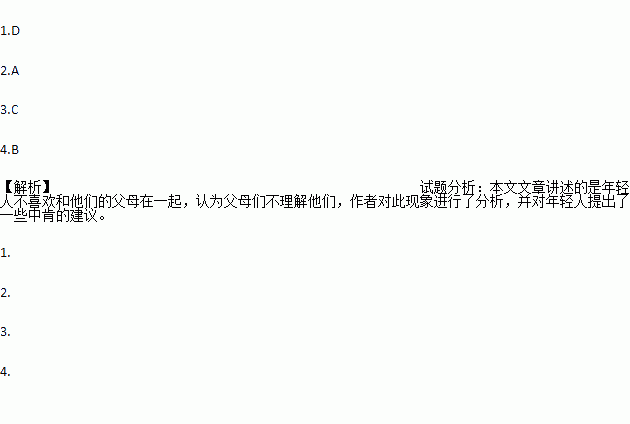题目内容
It is natural that young people are often uncomfortable when they are with their parents. They say that their parents don’t understand them. They often think that their parents are out of touch with modern ways, that they are too serious and too strict with their children, and that they seldom give their children a free hand.
It is true that parents often find it difficult to win their children’s trust and they tend(倾向) to forget how they themselves felt when young.
For example, young people like to act on the spot without much thinking. It is one of their ways to show that they have grown up and they can face any difficult situation. Old people worry more easily. Most of them plan things in advance, at least in the back of their minds, and do not like their plans to be upset by something unexpected.
When you want your parents to let you do something, you will have better success if you ask before you really start doing it.
Young people often make their parents angry with their choices in clothes, in entertainment and in music. But they do not mean to cause any trouble; it is just that they feel cut off from the older people’s world, into which they have not yet been accepted. That’s why young people want to make a new culture of their own, and if their parents don’t like their music or entertainment or clothes or their way of speech, this will make the young people extremely happy.
Sometimes you are so proud of yourself that you do not want your parents to say “yes” to what you do. All you want is to be left alone and do what you like. It is natural enough, after being a child for so many years, when you were completely under your parents’ control.
If you prefer to control your life, you’d better win your parents over and try to get them to understand you. If your parents see that you have a high sense of responsibility, they will certainly give you the right to do what you want to do.
1.According to the text, young people prefer to __________.
A. ask for advice before they really start to do anything
B. think in the same way as their parents do
C. be very strict with themselves
D. do things without thinking carefully ahead
2.Why do young people like to have clothes, entertainment and music in their way?
A. Because they want to try on something new and look different from the older.
B. Because they try to get their parents to be proud of them.
C. Because they want to give their parents a big surprise.
D. Because they want to test whether they are cleverer than old people.
3.According to the text, young people want to make a new culture of their own, because _________.
A. they feel they are cleverer than old people
B. they do not want to get into trouble with their parents
C. they don’t feel they belong to the world of the old people
D. they want to show the new is better than the old
4.If a young man intends to control his own life, it’s better for him to __________.
A. do everything according to his own wish
B. hold himself responsible for everything he does
C. do everything beyond his parents’ control
D. do everything the way his parents do


 in the program because __________.
in the program because __________.